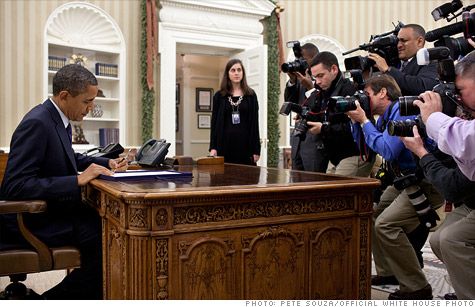Search News

Obama in the Oval Office.
NEW YORK (CNNMoney) -- President Obama will propose a budget on Monday that forecasts a $901 billion deficit in 2013, and includes plans to make targeted investments in areas like infrastructure while hiking taxes on the rich.
The White House bills the document as a "blueprint for how we can rebuild an economy where hard work pays off and responsibility is rewarded."
But given the intense acrimony in Washington, especially on budget issues, few provisions in the document are likely to ever become law.
The budget will project that the deficit for fiscal year 2012 will top $1.3 trillion, before falling in 2013 to $901 billion, or 5.5% of gross domestic product.
By 2022, the deficit is forecast to fall to $704 billion, or 2.8% of GDP, according to the White House.
Senior administration officials discussed details of the budget with reporters on Friday night. The full budget will be released Monday morning.
The administration officials said the budget is very much a continuation of two previous Obama keystones.
This first is a speech delivered last year in Kansas where he presented Americans with a choice: a "fair shot" with him, or a return to "you're on your own economics."
The second is last month's State of the Union address, which focused on the broad themes of income inequality.
The 2013 budget is somewhat limited in scope because the White House had to fit spending on discretionary accounts below the limits set in the Budget Control Act approved by Congress last summer.
Over a decade, the cuts enshrined in the Budget Control Act total in the neighborhood of $1 trillion in discretionary spending.
That means it's no easy feat to find room for additional spending on infrastructure, research and development and education -- investments Obama says are critical.
The White House said that in order to fit under the caps, it had to lower spending in certain areas. To that end, discretionary spending is projected to fall from 8.7% of GDP in 2011 to 5.0% in 2022.
The details on specific program cuts were not immediately available.
A few areas of reduction are known: Military spending will be reduced. The Pentagon plans to spend $487 billion less over ten years, a course that Secretary of Defense Leon Panetta has already laid out in some detail.
For example, Panetta has said the Army will save money by pulling two of its four brigades out of permanent bases in Europe to bases in the United States.
And the Navy will be getting rid of older ships that don't have the latest ballistic missile defense.
Of course, the budget doesn't just cut spending -- it also raises taxes.
The White House included $1.5 trillion in tax hikes, including a provision that will allow the Bush tax cuts to expire for high-income earners, a long-held Obama position.
The budget also incorporates the Buffett Rule, a guideline to ensure that the wealthiest do not pay a lower overall tax rate than those who earn substantially less money.
Specifically, no household making more than $1 million will be a allowed to pay less than 30% of its income in taxes.
In addition, the White House wants to reform the individual tax code in a way that "eliminates inefficient and unfair tax breaks for millionaires while making all tax breaks at least as good for the middle class as for the wealthy."
Later this month, the president will unveil a plan to reform corporate taxes, including lowering rates, administration officials said.
The budget to be released Monday will include many of the job creation provisions laid out in the American Jobs Act, a piece of legislation Obama delivered last year with great fanfare but was almost totally ignored by Congress.
The administration is also proposing a series of investments focused on infrastructure, education and domestic manufacturing, including old favorites like $30 billion to modernize schools and an additional $30 billion to retain and hire teachers and first responders.
The budget will also offer details on what the White House calls a Financial Crisis Responsibility Fee. The tax will raise $61 billion over 10 years from large financial institutions to help offset the cost of the TARP bailout and Obama's mortgage refinance programs.
The release of Obama's budget comes just as both political parties are ramping up efforts to fundraise and compete in both the presidential contest and crucial down-ballot races that will shape the next Congress.
That spells dysfunction on Capitol Hill.
Congressional Republicans have displayed no willingness to consider most of the president's proposals and are not likely to start now. ![]()
| Overnight Avg Rate | Latest | Change | Last Week |
|---|---|---|---|
| 30 yr fixed | 3.80% | 3.88% | |
| 15 yr fixed | 3.20% | 3.23% | |
| 5/1 ARM | 3.84% | 3.88% | |
| 30 yr refi | 3.82% | 3.93% | |
| 15 yr refi | 3.20% | 3.23% |
Today's featured rates:
| Latest Report | Next Update |
|---|---|
| Home prices | Aug 28 |
| Consumer confidence | Aug 28 |
| GDP | Aug 29 |
| Manufacturing (ISM) | Sept 4 |
| Jobs | Sept 7 |
| Inflation (CPI) | Sept 14 |
| Retail sales | Sept 14 |